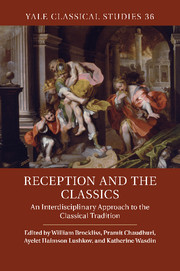Chapter 1 - Introduction
Published online by Cambridge University Press: 05 December 2011
Summary
This volume collects the majority of papers from a conference held at Yale University in 2007. That conference, also entitled Reception and the Classics, sought to define and articulate the particular role of Classics and classicists in the project of Reception Studies. The field of Reception Studies ranges over a vast stretch of time and material, from classical antiquity to the present day, from literature to art, music, and film; it is thus an inherently interdisciplinary field in its encompassing of a variety of departments and disciplines, each with its own canons, practices, and shared working assumptions. This interdisciplinary practice has formed the intellectual foundation for the present collection: although Reception Studies as a field has grown in scope and energy between conference and publication, we feel that the question of where Classics stands in relation to its peer disciplines remains alive and crucial.
Even today the practitioners of classical reception are, by and large, classicists; and although some names outside our discipline, such as David Quint and Kenneth Haynes, are perhaps well known to classicists, any such familiarity generally springs from their work on explicitly classical material or from their collaborations with classical scholars. And while many scholars rely on the classics for their own research in other fields, the work of non-classicists in this vein has often been seen not as part of a coherent discourse on the nachleben of Greek and Latin, but simply as accounting for the sources, cultural practice and intellectual curiosity of a Shakespeare, a Joyce, or a Petrarch, in the regular course of literary criticism. The difference between the approaches of scholars working within various institutional categories extends to more than a temporal perspective, since each department or discipline relies also on a hoard of specialized knowledge (linguistic, cultural, archival, etc.), to which outsiders are not always privy, nor do the audiences of each field overlap.
- Type
- Chapter
- Information
- Reception and the ClassicsAn Interdisciplinary Approach to the Classical Tradition, pp. 1 - 16Publisher: Cambridge University PressPrint publication year: 2011
- 1
- Cited by

